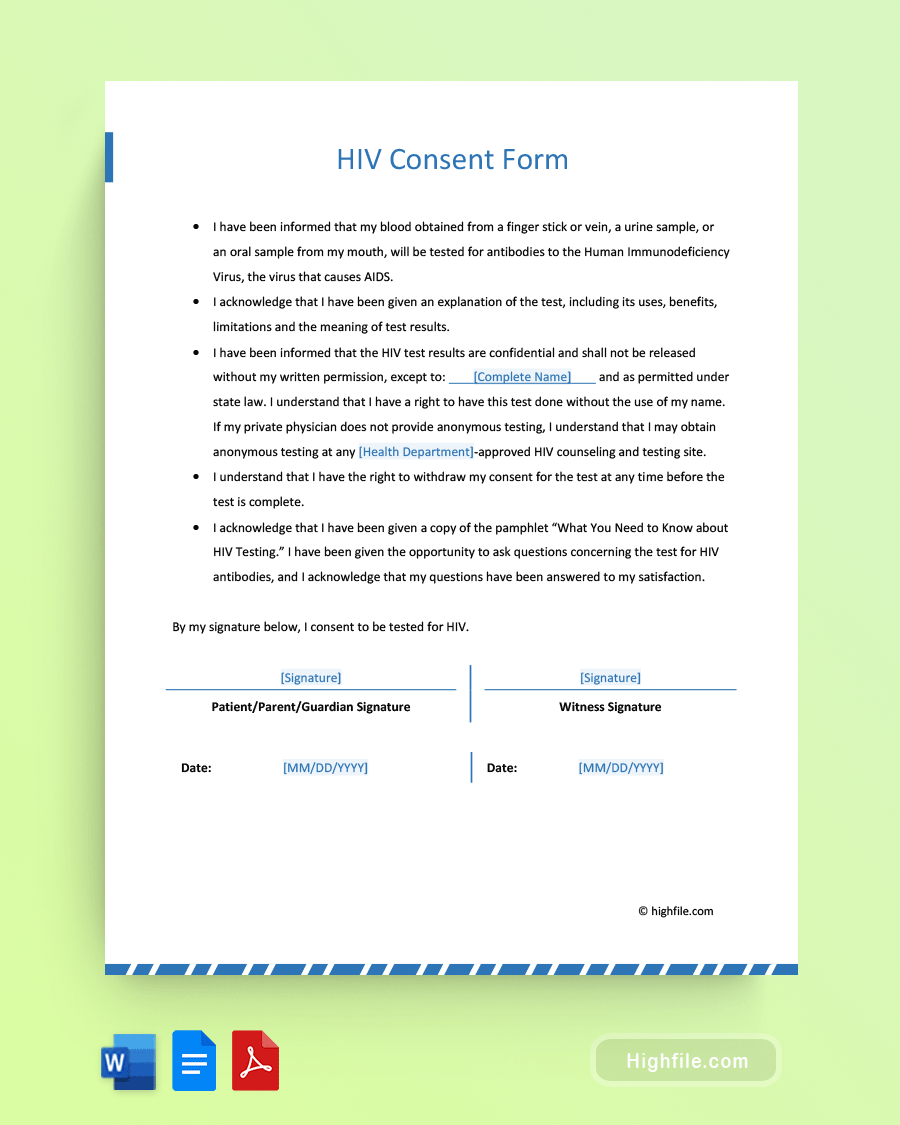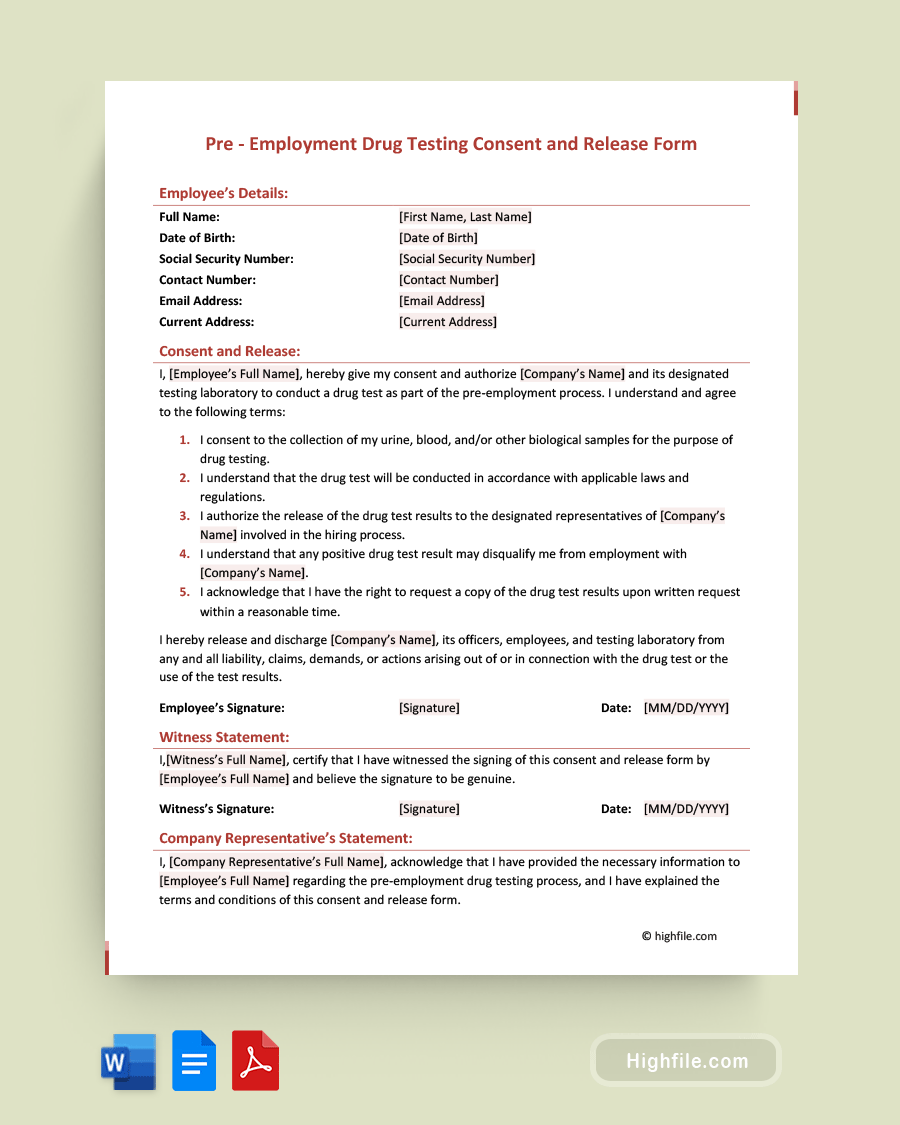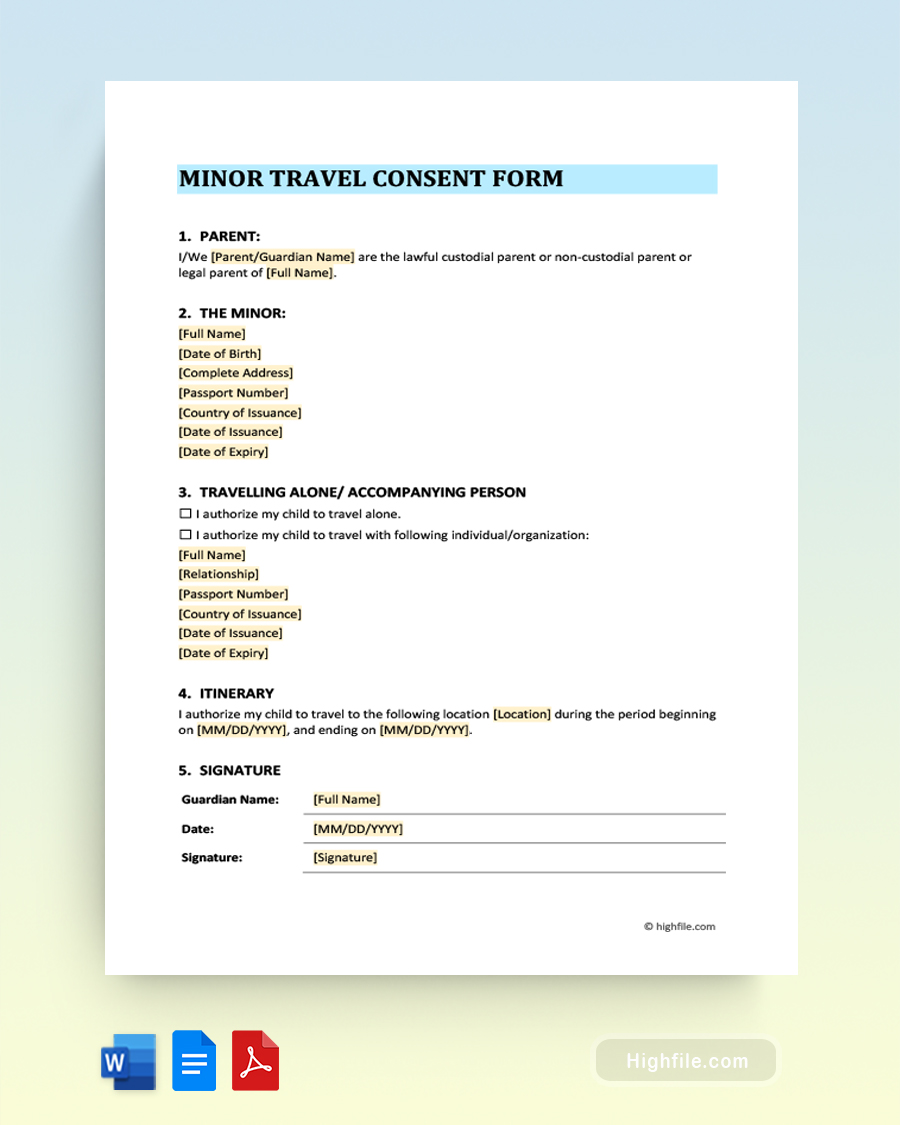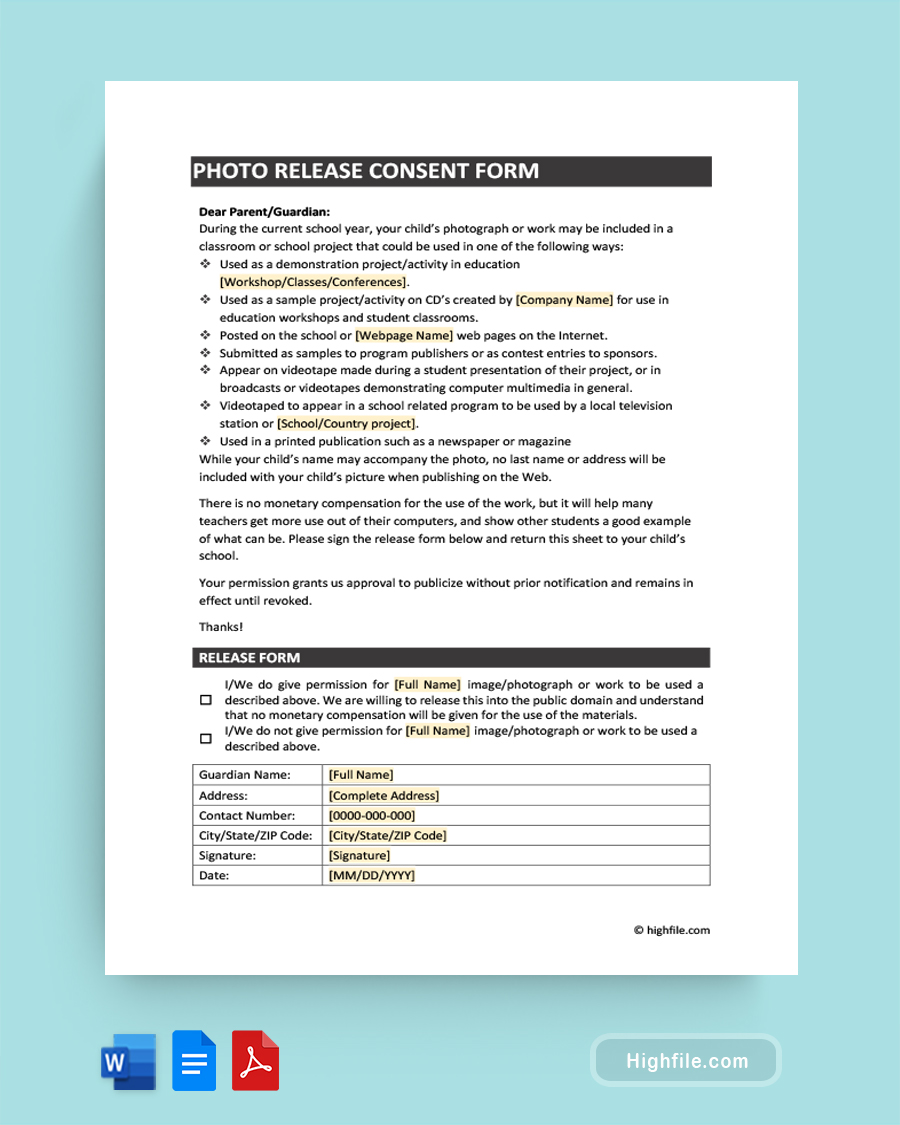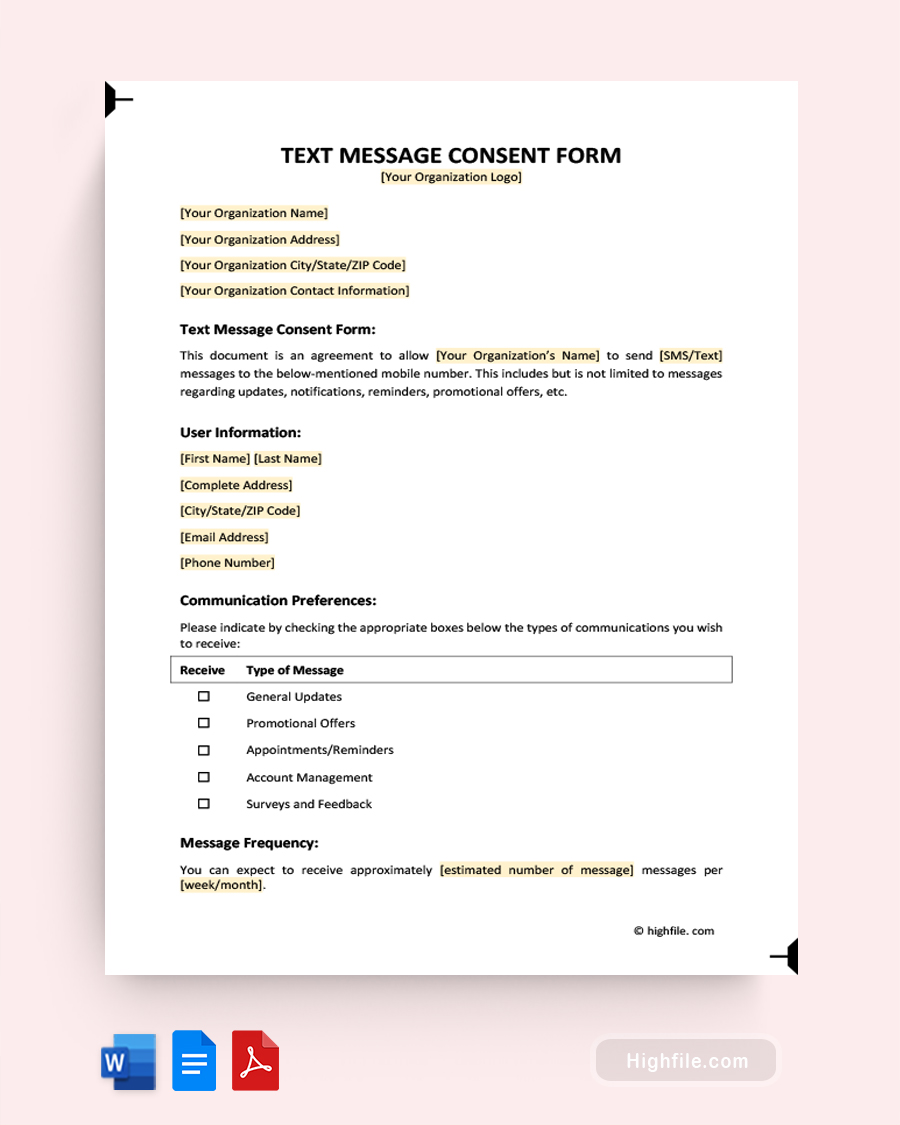Doctors need to have patients sign HIV Consent Forms before testing or treatment in order to ensure that the patient is informed and aware of the risks and implications associated with being tested or treated for HIV. By having the patient sign a consent form, the doctor can ensure that the patient understands the potential benefits and risks of the procedure and that they are willing to proceed. Additionally, a signed consent form can act as legal documentation that the patient has given their informed consent to be tested or treated for HIV. This is also important for the physician if any complications arise as a result of the procedure, as it will provide some protection against litigation. A professional HIV consent form template may help you save time and create professionally designed reusable high-quality documents.
What Is an HIV Consent Form?
An HIV consent form is a legal document that gives consent for an individual to receive an HIV test or treatment. The patient or responsible party must sign before any testing or treatment can occur. The document states that the patient or responsible party has been informed of the risks and agrees to proceed. It also outlines the patient’s rights and responsibilities regarding any potential test outcomes. Just as important, it is designed to protect the rights of patients and medical staff while allowing the patient to give their informed consent to proceed with testing.
Why Is HIV Consent Form Important?
An HIV Consent form is important for numerous reasons. Below we’ve created a list of all the reasons you and your patients need these forms.
- To respect patient rights and bodily autonomy
- To protect doctors from litigation arising from the results or procedure
- To ensure the patient understands the risks and benefits of this vital medical test or treatment
- To follow the law
- To have proper documentation of informed consent
- To offer the patient the option of acceptance or refusal at their sole discretion
- To inform patients of their responsibilities concerning the result of a positive test
Laws and Standards for HIV Consent Forms May Vary
The standards and laws regarding these crucial documents may vary depending on where you live. Additionally, the laws and practices concerning confidentiality also vary. For example, in some areas, it is considered in the best interest of public health and safety to disclose test results to certain types of employers or contact anyone who may have been exposed so they can get tested. If you want to learn more about the practice in your area, please consult an attorney.
What Information is Included in an HIV Consent Form?
The information included in an HIV consent form is critical yet easy to understand. In essence, it says that the patient has been given an explanation of the process, understand the risks and benefits, have had a chance to ask any questions they may have, and either consent to or refuse the test (or treatment). Below you’ll see an outline showing each part of the form and why it is included.
- Form Title- The title says what the form is and its intended purpose so the reader knows what they are reading and signing.
- Assent Statements- Assent statements outline the agreements and show that the patient’s rights have been respected.
- Consent Indication- This says they agree to the test or treatment.
- Signature and Date Lines- A signature is what makes a document legally binding.
- Parental Signature and Date Lines- If the patient is under 18, they need a parent’s consent for an HIV test or treatment.
- Refusal Indication- This says they refuse the test or treatment.
- Signature and Date Lines- These are exactly like the lines above but are intended for when a patient refuses.
- Parental Signature and Date Lines- As stated above, a person under 18 needs their parent or guardian’s consent.
Please Note: Patients can only sign either the consent or the refusal portion, but not both. If they have signed both, the form is invalid, and you should provide them with a new copy. Explain why they cannot consent and refuse consent at the same time.
FAQs
To help ensure you can create the best possible document from your HIV consent form template, we’ve answered the most frequently asked questions about this topic. Below you will find answers about patient confidentiality, whether people can get fired over their test results, the right to refuse, and so much more.
HIV testing is not mandatory in the United States. The decision to get tested for HIV is entirely up to an individual. However, HIV testing is recommended by the Centers for Disease Control and Prevention (CDC) for all adults, particularly those at higher risk of infection, as part of routine health care. Many states have laws and regulations that require healthcare providers to offer HIV testing to their patients or to provide counseling on HIV and other sexually transmitted diseases (STDs). Some states also require healthcare providers to offer HIV testing to patients who are at high risk for HIV infection, such as those who use intravenous drugs.
Some jobs require HIV testing for safety, but you may refuse. However, your right to refuse the test does not impart the right to have the job without meeting the requirements. The only real exception is military personnel who can be ordered to take a test, but only because they agreed to the terms when they signed up.
Your HIV status is typically kept entirely confidential. This means that your personal information and medical records will not be shared with anyone without your permission. In most states, only healthcare providers, laboratory personnel, and insurers can access your HIV status information. Additionally, all medical information must be kept secure and confidential in accordance with the Health Insurance Portability and Accountability Act (HIPAA). Confidentiality laws also protect you from discrimination based on your HIV status. In some states, it is illegal to discriminate against someone because of their HIV status in housing, employment, or insurance.
If your HIV test result is positive, it means that you have been infected with the Human Immunodeficiency Virus (HIV). It is important to remember that a positive result does not mean that you have AIDS. HIV is a virus that can lead to AIDS if it is not treated. When your HIV test result is positive, seeking medical care right away is vital. Your doctor can provide you with information about treatment options and support services. Treatment for HIV can help you stay healthy and reduce the risk of transmitting the virus to others. It is also vital to talk to any recent sexual partners you’ve had or other people you might have exposed through fluid contact, such as bleeding on them.
Yes, you can refuse to sign an HIV Consent Form. However, it is essential to understand that the form is required for any testing related to HIV, including for the processing of results. Therefore, if you do not sign it, you may not be able to get the results or treatment you need. If you have any questions or concerns about signing the form, it is best to speak with a doctor or healthcare provider. Moreover, refusing your consent can have other consequences. For example, you will be denied if the test is a prerequisite for a job, volunteer position, or other opportunities.
Under the Americans with Disabilities Act (ADA), employers are prohibited from discriminating against individuals with disabilities, including those with HIV. Typically, employers cannot fire or refuse to hire someone solely because they have HIV. However, if an employee tests positive for HIV and cannot perform the essential functions of their job, then the employer may be able to terminate the employee. Additionally, employers may be able to terminate an employee if their HIV status directly threatens the health or safety of other employees or customers.
It is important to note that employers must provide reasonable accommodations for employees with HIV. However, if an employee’s HIV status affects their ability to perform their job duties, then the employer may be able to terminate the employee legally. Additionally, if an employee’s HIV status poses a risk to other employees or customers, the employer may be able to terminate the employee legally. It is important to note that employers must follow all applicable laws when making decisions about firing an employee due to their HIV status, and these exceptions are rare.
Disclaimer
The information provided in this article and the HIV Consent Form template is for general educational and informational purposes only and should not be construed as medical or legal advice. Please note that state, provincial, or local requirements may vary with respect to HIV consent forms. Consult a legal professional to confirm any specific requirements in your area.
Final Thoughts
The HIV consent form is a document that outlines the risks and benefits of HIV testing, as well as the patient’s rights and responsibilities related to HIV testing. By signing this form, the patient is agreeing to have the HIV test performed and is also taking responsibility for understanding the risks and benefits associated with it. The document also serves as a way for healthcare providers to protect themselves from liability in case any issues arise from the test results or the testing process itself. By having a patient sign an HIV consent form, healthcare providers ensure that patients know the potential risks and benefits associated with testing. Using a professionally designed HIV Consent Form Template can help you create an outstanding legal document in very little time.
